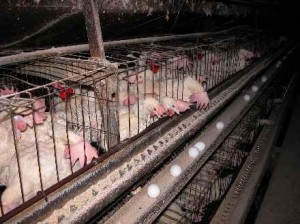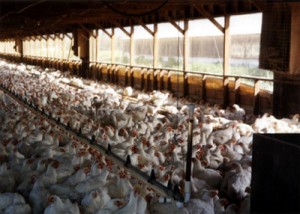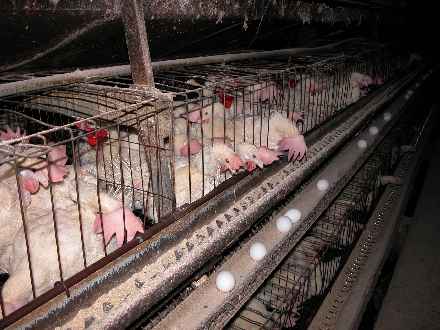 I’ve received far too many questions about the egg recall to single out only one… but what I will do, is do my best to give as thorough of an understanding of how this kind of thing happens and what we can do to avoid this kind of risk in the future.
I’ve received far too many questions about the egg recall to single out only one… but what I will do, is do my best to give as thorough of an understanding of how this kind of thing happens and what we can do to avoid this kind of risk in the future.
I’m trying to be as sensitive to the topic as possible, but it isn’t for the very sensitive or faint at heart. There are no gruesome photos within this post.
In the event that you didn’t know (since some areas of the US are unaffected by the recall, it is possible), here’s a brief recap:
A half-billion eggs have been recalled in the nationwide investigation of a salmonella outbreak that Friday expanded to include a second Iowa farm. More than 1,000 people have already been sickened and the toll of illnesses is expected to increase.
Iowa’s Hillandale Farms said Friday it was recalling more than 170 million eggs after laboratory tests confirmed salmonella. The company did not say if its action was connected to the recall by Wright County Egg, another Iowa farm that recalled 380 million eggs earlier this week. The latest recall puts the total number of potentially tainted eggs at over half a billion.
An FDA spokeswoman said the two recalls are related. The strain of salmonella causing the poisoning is the same in both cases, salmonella enteritidis.
The eggs recalled Friday were distributed under the brand names Hillandale Farms, Sunny Farms, Sunny Meadow, Wholesome Farms and West Creek. The new recall applies to eggs sold between April and August.
Hillandale said the eggs were distributed to grocery distribution centers, retail groceries and food service companies which service or are located in fourteen states, including Arkansas, California, Iowa, Illinois, Indiana, Kansas, Minnesota, Missouri, Nebraska, North Dakota, Ohio, South Dakota, Texas, and Wisconsin. [source]

Sure, you can get salmonella plenty other ways… but for the intent of what I’m explaining here, this is where I’m going with this.
In hens, if feces touches their feed and enters their mouths, salmonella nests within their ovaries, thus affecting the eggs they lay. Feces can intermingle with their feed by improper cleaning of the hen house, rat droppings, unhygenic workers… whatever. It happens.. and it’s disgusting.

You know how a factory has that kind of assembly line style, where everything is organized in a way that allows for the most product to be created as quickly as possible? Factory farming is no different. Factory farming streamlines processes in as tightly organized spaces as possible, in order to maximize output and minimize waste.
It makes sense… except, we’re talking about animals, here. Not even in the “animal rights” sense, here – animals are unpredictible. Animals develop illnesses… contagious… illnesses. Salmonella, for starters. Hens contained in tight spaces where there’s a rat infestation problem are bound to all wind up sharing the same feed infested with the same rat feces. Now, to mitigate the risk of disease in factory farms, hens are given antibiotics. Lots of antibiotics…to help them live in environments they aren’t supposed to live in, like factory farms. As you can see, it’s vital for farmers to be vigilant in keeping hen houses free of infestations… because if not, 380 million eggs can be recalled for fear of spreading the disease into the public.
Speaking of recalls… let’s talk about the FDA. They can’t. Recall, that is. The FDA is not authorized to issue recalls. The FDA can “announce” a recall and, to save face, “order” a recall… but they are not authorized to snatch anything off the market. Consider this:
When a product is defective or harmful to the public, the Food and Drug Administration (FDA) may order or request a recall of the product from the market. Sometimes, the manufacturers of defective products will voluntarily recall the defective product, while other recalls are ordered by the FDA.
Can the FDA Order a Recall?
The FDA does not have the authority to “order” recalls. Instead, under the Federal Food, Drug, and Cosmetic Act, the FDA may “request” the recall of a harmful consumer product if the manufacturer is unwilling to recall the product without the FDA’s written request. [source]
Going back to the first article I quoted:
Almost 2,000 illnesses from the strain of salmonella linked to both recalls were reported between May and July, almost 1,300 more than usual, Braden said. No deaths have been reported. The CDC is continuing to receive information from state health departments as people report their illnesses.

Except… the owner of the Wright County Farm, Jack DeCoster, is someone who generally doesn’t tend to his farm the way he should. Consider the following:
• In 1997, DeCoster Egg Farms agreed to pay $2 million in fines to settle citations brought in 1996 for health and safety violations at DeCoster’s farm in Turner, Maine. Then-Labor Secretary Robert Reich said conditions were “as dangerous and oppressive as any sweatshop.” He cited unguarded machinery, electrical hazards, exposure to harmful bacteria and other unsanitary conditions.
• In 2000, Iowa designated DeCoster a “habitual violator” of environmental regulations for problems that included hog manure runoff into waterways. The label made him subject to increased penalties and prohibited him from building new farms.
• In 2002, the federal Equal Employment Opportunity Commission announced a more than $1.5 million settlement of an employment discrimination lawsuit against DeCoster Farms on behalf of Mexican women who reported they were subjected to sexual harassment, including rape, abuse and retaliation by some supervisory workers at DeCoster’s Wright County plants.
• In 2007, 51 workers were arrested during an immigration raid at six DeCoster egg farms. The farm had been the subject of at least three previous raids.
• In June 2010, Maine Contract Farming – the successor company to DeCoster Egg Farms – agreed in state court to pay $25,000 in penalties and to make a one-time payment of $100,000 to the Maine Department of Agriculture over animal cruelty allegations that were spurred by a hidden-camera investigation by an animal welfare organization. [source]
Oh, okay.
One question I was asked was how do we, as consumers, avoid this kind of risk?
The reality is that because there is no frequent or regular monitoring of these farms, and the only thing keeping many of these hens from developing salmonella is whether or not the farmer manages to remember to call The Orkin Man… we’re constantly at risk. Since salmonella can hang out inside the egg shells as well as on the outside, it is ideal to make sure you’re cooking your eggs all the way through as well as washing your hands before and after handling eggs. If you’re baking, be sure your dishes are cooked all the way through, to an internal temperature of 160 degrees F.
There’s also the option of purchasing your eggs at a local farm (hey, I have to throw the locavore angle in there.. sorry) where you can see the conditions of the hen house yourself. I don’t eat eggs often – I do buy them when I bake and when I make my mayo – but because of the rarity, it doesn’t hurt too much to buy the eggs from the better-kept chicken. If you’d rather do that, but know it’ll kill your budget… why not eat less eggs? Instead of having two eggs in your omelet, have one and add a variety of peppers. Instead of two scrambled eggs, go for one and add a nice breakfast fruit to your plate. I’d actually taken to using alternatives to eggs in my baking, and while I’m still perfecting that (because that is a craft in itself), it’s proving to be a better option for me already.
Sure, there are the eggs at the store that say “cage free” or “free range (eggs?)” or “these eggs have danced under the Georgia sun”… whatever. None of those claims are regulated or verified by any agency. “Organic” is it (and boy, can it be pricey.) An “organic” label means that an organization has certified this product as not using antibiotics or pesticides to provide you with a healthy product.
I hate to drive home the same point repeatedly, but this is why it is so important to know where your food originates. Cutting out as many middle men as possible – the grocery, the shippers, the factory – not only benefit the environment (no shipping, no gas, no pollution), but benefit your health as well. It’s tough, can be pricey if we don’t alter our habits to accommodate our new food items, and is very frustrating… but the payoff is well worth it.
No one can make those kinds of changes or modifications to their lifestyle overnight, but as they used to say… “knowing is half the battle.” Now that you know, you can make the appropriate changes to your life and do what you need to do.
Resources:
- FDA: Salmonella Q&A
- How Does Salmonella Get Inside Chicken Eggs?
- Salmonella Enteritidis: From The Chicken To The Egg
- CDC On Salmonella Enteritidis
- Touting Factory Pig Farming Safe?
- Recall Expands To More Than Half A Billion Eggs



7 comments
Hi there. I’m a heavy egg eater. I’ll stirfry broccoli, onions, garlic, mushrooms and garlic, then add a scrambled egg on top for a quick one dish meal. Or boiled eggs to a green salad. Or mixed in with canned salmon for croquettes. And the list goes on. Eggs have been good as an inexpensive meat replacement. Due to the recalls, I bought my last 3 dozen from a local amish farm 30mins from my house via freeway. I knew they provided chickens for some of the stores here, but eggs have to be bought at their farm. I just found out I can buy a lot more than just eggs and chickens: ducks (and their eggs), geese (and their eggs), turkeys (no eggs),lamb, prepared pork (Yay for bacon!!!) sides of beef, dairy, some produce, and other baked goods. You can pre-order a 1/4-to a whole pig, lamb and cow/bull, or pay more for cuts. I was blown away!
Now I’m thinking about buying a freezer to keep this abundance of fresh tomatoes, corn, string beans, zucchini, peaches, pesto!! that I can buy now for cheap at the farmer’s market thru September. And the thought of buying meat from a local farm where I can see how the animals are being raised without hormones, or confined in grain lots is worth the additional $1-$2/lb extra in cost. And surprise: There’s a HUGE difference in taste! Just a different way of thinking about my food by stepping out of my comfort zone to buy some safe eggs.
I’m jealous Joanna. A friend of mine laughs at me when I say that I would just love to develop a standing relationship with a farmer, a rancher, and a fisherman. My granddad has a great and surprising source of eggs. He gets them at the flea market. There’s a man there who sells the eggs of his chickens that run free under the Carolina sun. The proof is that his land is accessible enough so that curious people can check on the conditions of the chickens. A warning about something like this. THis is this mans side business so a dozen eggs will contain brown and white eggs (and some other colors), they will not be shiny and stamped with a logo (so you may have to wash feathers off the eggs), and you will likely get a few double yolk eggs in a dozen. BUt for a buck/dozen you can’t beat this source.
Hello CJM. I live in Michigan and at the weekly farmer’s mkt, there’s this guy that sells mushrooms he grows as well as foraged. I bought 1/2lb of fresh Morels this Spring from him for $10. In the stores, dried morels go for $9+/ounce! There’s another guy who sells greens, and another from whom I buy the huge heirloom tomatoes that I don’t grow, and another who sell fresh shallots and garlic, and so on. You either bring a cart or plan on multiple trips to the car. But the produce is so fresh and cheap, and you meet people, and try new things.
My grandmother used to go at the close of day to get boxes of end-of-the-day/bruised produce for a dollar. Then my cousins and I were shanghaied into helping her peel, blanch, and can stuff for the winter. Funny how now I’m going back to those memories. I like knowing that the food I put in my mouth is going to nourish not just my body, but my soul.
[…] duplicating what has been said so far, but I’ll make a quick summary for a bit of context: (Here’s a good explanation of the egg recall as it applies to the public. […]
Erika,
I found this article while researching my own article. You have such a well-done explanation that I linked to you. (And I love your entire website — beautiful design!)
I would like to see our food industry and government clean up their acts and improve the safety for the American public. I hope your readers will contact their congressmen/congresswomen to encourage them to make something happen.
Throwing in another certification to consider: “certified humane” (www.certifiedhumane.org). If I can’t find eggs from a local, trusted farm source, I try to get eggs with this certification.
This farm certification program is run by Humane Farm Animal Care, a nonprofit organization. It’s not a government agency, but the farms that adhere to the certification standards treat their animals exceedingly well. And the high quality of the food shows!
I have seriously cut back on my egg consumption. I don’t buy them for home (I use flax/chia/egg replacer when baking) and the only time I eat them is going out to eat occasionally. I have found that eggs, like all animal products, isn’t necessary in my diet and I do just fine without it. Cheap food isn’t worth my life.
Comments are closed.